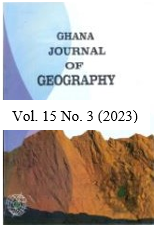Investigating Indigenous Knowledge Developed by Agro- Pastoralists to Cope with Climate Change and Variability in the Agro-Pastoralism Region of Rwanda
Abstract
The main objective of this research was to assess indigenous knowledge developed in the agro-pastoralism region of Rwanda to cope with climate change. The study was conducted in drought-prone area of Nyagatare and Gatsibo Districts. Four hundred and eighty (480) households of agro-pastoralists were sampled randomly in 40 villages and interviewed. Focus Group Discussion and interviews with key informants were also used for data collection. Data were analysed using SPSS Statistics 28.0.1. Results indicated that local communities are traditionally using cloud/sky colour (80.6%), change of temperature during the day (66.5%), direction and strength of winds (58.8%) and lightning and thunder (46.3%) in weather forecasting. Further, locally made pesticides (42.9%), burning of pastures and farm residues (41.3%), early handweeding (59.8%), early planting (61.5%), indigenous medicines (33.3%) and indigenous crops and livestock breeds (61.0%) are used for diseases and pest management. Further, farming and grazing along rivers and wetlands (61.3%) and tolerant or early maturing crops (51.9%) are used for drought. Based on these results, the researcher concludes that there is evidence of the role of indigenous knowledge in adaptation to climate change. I, therefore, recommend that indigenous knowledge should be incorporated into the adaptation process, especially at the community level. This would include formal recognition, empowerment of its custodians, and simplified training and awareness.




